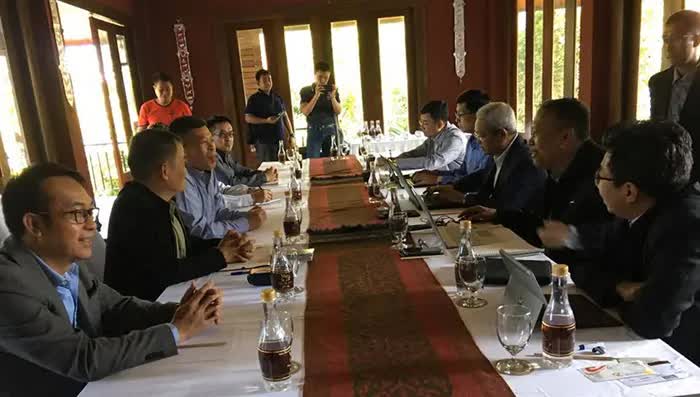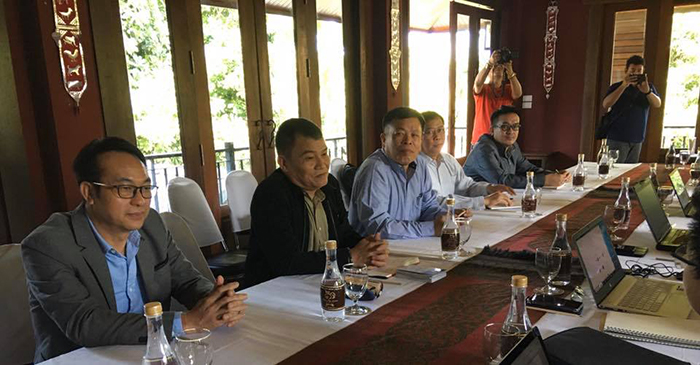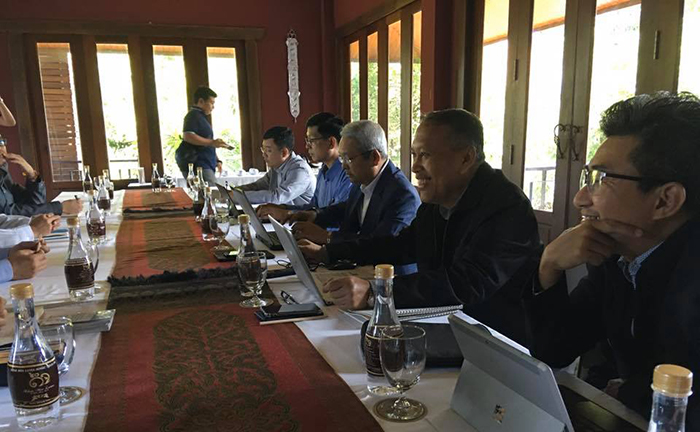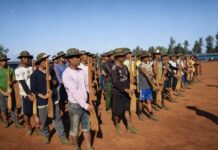On the heels of the Nationwide Ceasefire Agreement-Signatory-Ethnic Armed Organizations (NCA-S-EAO) three-day meeting that ended on October 12, the Peace Commission (PC), under the government National Peace and Reconciliation Center (NRPC), flew to Chiang Mai, Thailand to meet the Karenni National Progressive Party (KNPP), Kachin Independence Organization/Army (KIO/KIA), Restoration Council of Shan State (RCSS) and the Karen National Union (KNU).

All mentioned groups the PC has met are all NCA-S-EAO members, except the KNPP which has still to sign the NCA.
The government delegation included PC Secretary a retired Lieutenant General Khin Zaw Oo, President’s Office Director Zaw Htay and PC advisers Hla Maung Shwe and Moe Zaw Oo.
The government PC and the KNPP met on October 18 in Chiang Mai.
It was said the unofficial meeting with the KNPP touched on the issues of bilateral ceasefire possibility and development of the Karenni (Kayah) State.
The KNPP was led my Vice-Chairman Khu Oo Reh, accompanied by Deputy-Commander-in-Chief General Aung Myat, Aung San Myint, Nei Neh Plo and Khun Naung.
For its part, the KNPP spokesman Nei Neh Plo said that firstly an attitude of trust will have to be present which isn’t the case and conducive enough to help achieve such an atmosphere. He added that this lack of trust resulted from the occurrences at the ground level and this could even become widespread and contagious to include the signatory EAOs, which might ruin the whole NCA-based peace process.
While the spokesman didn’t spelled them out, it is understood that they are controversial issues of erecting the late General Aung San statue against the wish of Karenni people and the jailing of the activists; land confiscation of the government and Tatmadaw; and the still unresolved case by the of the killing of KNPP soldiers by the Tatmadaw, at a place not far from Loikaw.

He explicitly stressed that until such issue happenings at the ground level are resolved, it will be impossible for them to sign the NCA.
On the same day, the KIO headed by Chairman General N’Ban La met the PC, where the discussion centered on bilateral ceasefire, signing of the NCA and repatriation of the Kachin internally displaced persons.
The outcome of the unofficial meeting was not known as both camps refused to make public on it. But speculations are that the PC might like to woo the KIO to sign the bilateral ceasefire pact alone and would possibly try to divide it from the Northern Alliance – Burma (NA-B), of which it is a member and the insistence to ink the bilateral ceasefire together.
The NA-B is made up of Arakan Army (AA), KIA, Myanmar National Democratic Alliance Army (MNDAA) and Ta’ang National Liberation Army (TNLA).
The RCSS led by General Pong Khur, accompanied by Sai Ngin, Dr Sai Oo, and Sai Leng met the PC on the same day in Chaing Mai, where discussion over Joint Implementation Coordination Meeting (JICM) to implement the NCA; outstanding and unresolved implementation issues agreed in the bilateral ceasefire; and the holding of fourth anniversary NCA signing.
Since the RCSS opted out of the official peace negotiation process at the end of 2018, it has met the government unofficially for 13 times. And in August 20, General Yawd Serk leader of the RCSS met the NRPC representatives in Chiang Mai, where he told the media that the government four-point proposal to restart the peace process will continue to be discussed.

After recent meeting the RCSS, Zaw Htay regarding the scenario with the NCA-S-EAO explained to the media that the meeting has been fruitful. He said that in order to go ahead with the peace negotiation process a JICM, the highest organ in the NCA-based peace process, has to be held, where all ethnic signatory leaders and government top leaders, including the Tatmadaw will participate.
According to him, the four-point agreement agenda between the government-military and the EAOs that will enable to achieve peace has to be put into practice which are: implementation of the NCA; plans on going about with the peace process before and after 2020 national election; theoretical formulation of democracy and federalism; and handling of the transitional period after the signing of NCA.
On October 16, Zaw Htay said that the PC also met the some KNU leaders and was able to clarify unclear issues between each other.
Given such political development, the atmosphere is favorable to nail the four-point agreement agenda that could restart the official peace process, with the green light from the JICM and further endorsement from the parliament.
While the speculated positive political atmosphere is encouraging and the official peace negotiation process will likely be restarted, the main obstacle remains, as all-inclusiveness participation of all EAOs is still not viable, due to the constant fighting in northern Shan and Arakan States.
Without the NA-B bilateral ceasefire in place, all seven members of the Federal Political Negotiation and Consultative Committee (FPNCC) will be out in the cold.
The FPNCC includes the four-member NA-B, the United Wa State Army (UWSA), National Democratic Alliance Army (NDAA) and Shan State Progress Party (SSPP), all of which are non-NCA signatories.
But if the four-point agreement agenda of the government-military and NCA-S-EAO will be able to officially restart the NCA-based peace process and also brings in the FPNCC into the fold is for now anybody’s guess.











Leave a Comments